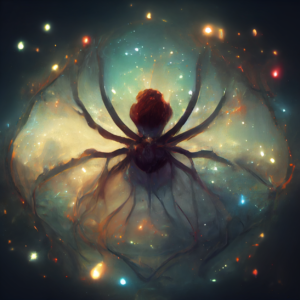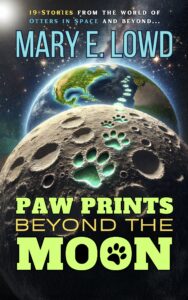by Mary E. Lowd
Originally published in Furvana 2019 Conbook, September 2019

Ariadella chose a cozy corner of the universe where the velvety blackness was thick with a rich, fizzy soup of hydrogen and helium. She settled into the lonely void and began gulping up the fizz, letting it process deep in her belly, until she had enough dark matter to begin spinning.
With her thousands of legs, Ariadella pulled silk from her spinnerets. The gravitational lines of silk brought tension, structure, and form to the swampy darkness. She spun from a central point outward, choosing a spiraling pattern as she went.
Ariadella had watched other, older galaxy-spinners work their webs before. She’d seen their erratic patterns — artless and chaotic. She had better plans. At each vertex, she spat out a burning glob of plasma, and as her gravitational web lit up with the brilliant glow of millions upon millions of stars, the first spiral-armed galaxy was born.
Ariadella was proud of her web.
Other galaxy-spinners came to admire her innovative work, and she graciously granted them permission to imitate her beautiful spiraling pattern.
Then one eon, a galaxy-spinner visited Ariadella and instead of admiring her work, he guffawed and chortled, all the thousands of his many-jointed legs shaking with mirth.
“Why do you laugh?” she asked.
“Your web is so perfect,” he said, “but empty. Do you think it’s too perfect to spoil it with life?”
Ariadella had grown so content with her perfect web and her fame that had drawn the admiration of other galaxy-spinners that she had not ventured out into the universe in countless eons. “Life?” she asked.
The other galaxy-spinner brought her to his web and showed her — around each star, he’d placed broken fragments of matter, little dust balls, and on the dust, complex carbon structures had bloomed, grown, spread. In some cases, the carbon structures built minuscule vessels to protect them from the soupy black vacuum of the universe and they hurled themselves across the gravitational lines of the galaxy-spinner’s web.
The minuscule carbon structures were fascinating.
“Each one is different,” he explained. “You have to design them properly to survive on the different worlds.”
“Worlds… you mean, the tiny balls of dust?”
“Yes.”
Ariadella returned to her own spiral-armed galaxy and began scattering broken bits of matter around all the stars, helter skelter, hoping some of them would grow the fascinating carbon structures.
Over time, with practice, Ariadella’s skill grew, and she cultivated a complex garden of carbon structures. She watched them turn their specks of dust from dusty red-and-yellow to vibrant green-and-blue. Then they built their tiny vessels, hurled themselves to new specks of red dust, and turned those ones green too.
Ariadella was not satisfied with watching the carbon structures from a distance, and she built herself stronger and stronger magnifying lenses by warping the shape of space-time so she could see the carbon forms close up.
On the different worlds, there were scaly carbon structures with fins, and squishy ones with tentacles, and many-legged ones that made Ariadella think of herself and the other galaxy-spinners. But her favorites were the fuzzy ones.
Ariadella began tweaking the recipes of her worlds, pushing them towards developing tiny, fuzzy creatures to crawl all over their surfaces. She was not always a benevolent god. Sometimes, she decided she didn’t like how a world was developing — too much metal, too much concrete, spreading across the world like a disease — and swept the specks of dust into the stars they orbited. Or she sprinkled smaller specks — comets and asteroids — on a world, altering its atmosphere and causing cataclysms until she was happier with the world’s development. Tending and weeding her garden kept Ariadella occupied, but she felt a restlessness that spinning never seemed to soothe.
Finally she grew a perfect world. The creatures on its surface were fuzzy, fluffy, adorable. Their ears were large and triangular; their tails long and swishy. They swam along the ocean shores of their world and built castles just beyond the shorelines.
Ariadella watched the fuzzy creatures, totally entranced, as they transformed their speck of a world into a paradise. Civilization spread along the coastlines, but didn’t overtake the wild green forests, as Ariadella had seen happen on so many of the other worlds in her galactic garden. This world did not become encased in metal, crisscrossed with blacktop. The fuzzy creatures never stopped returning to the waves, swimming, dancing, remembering freedom and fun.
Ariadella knew she wanted to join them. It was time to retire from gardening; she had warped the shape of the universe enough. And here in her galactic web, she’d finally found the perfect home.
So Ariadella drank deeply of the fizzy soup of hydrogen and helium that was the background matter of the universe, until her belly was filled to bursting. She drew gravitational silk from her spinnerets and began wrapping herself, binding her legs tightly against her body, ensconcing herself in a chrysalis that warped the dimensions around her and crushed her down, smaller and smaller, denser and denser, like a piece of coal becoming a diamond. Until finally all that was left of her was a minuscule comet, barely larger than a single one of the fuzzy creatures she adored so deeply. The comet fell through the galaxy on the course she’d planned, and inside of it, her body transformed.
Ariadella’s chrysalis streaked across the sky of her favorite world: a brilliant, shining, falling star. It crashed into the waves. And on the inside, she slept.
Ariadella had never slept before. Galaxy-spinners don’t. But small, fuzzy mammals do. And inside her chrysalis, she dreamed.
She dreamed of being a multi-dimensional, thousand-legged spinner, spinning webs that more than filled the sky — the webs were the sky. And she also dreamed of being a fox-like creature, fluffy, warm-blooded, with a heart that beat with the rhythm of ocean waves, frolicking in the salty spray beside the sea.
She awoke from her dream and clawed her way out of the sticky, slimy silk, wet with ocean water. As her chrysalis tore apart, Ariadella stretched out legs and arms that felt different, fewer. When her paw — one of four, instead of thousands — touched the cool, packed sand outside her chrysalis, a shiver ran through her body, fluffing out her fur and causing her tail to swish. She was an inhabitant now, no longer an architect.
In the distance, Ariadella saw more fox-like creatures. They approached her cautiously, speaking a language she didn’t know, full of yips and chuffs. Her ears flicked in response. She felt shy and confused. But one of the foxes with blue-and-black striped fur came up, touched a wet nose to hers, and then grabbed her paw. The fox squeezed her paw, and she squeezed back. Another fox came forward and put a paw on her shoulder.
Green eyes sparkled at her, and she saw herself reflected in them. And the million subtle shades of green, in lines and flecks, in this fox’s eyes were more beautiful than an entire spiral galaxy.
 Read more stories from Paw Prints Beyond the Moon:
Read more stories from Paw Prints Beyond the Moon:
[Previous][Next]
